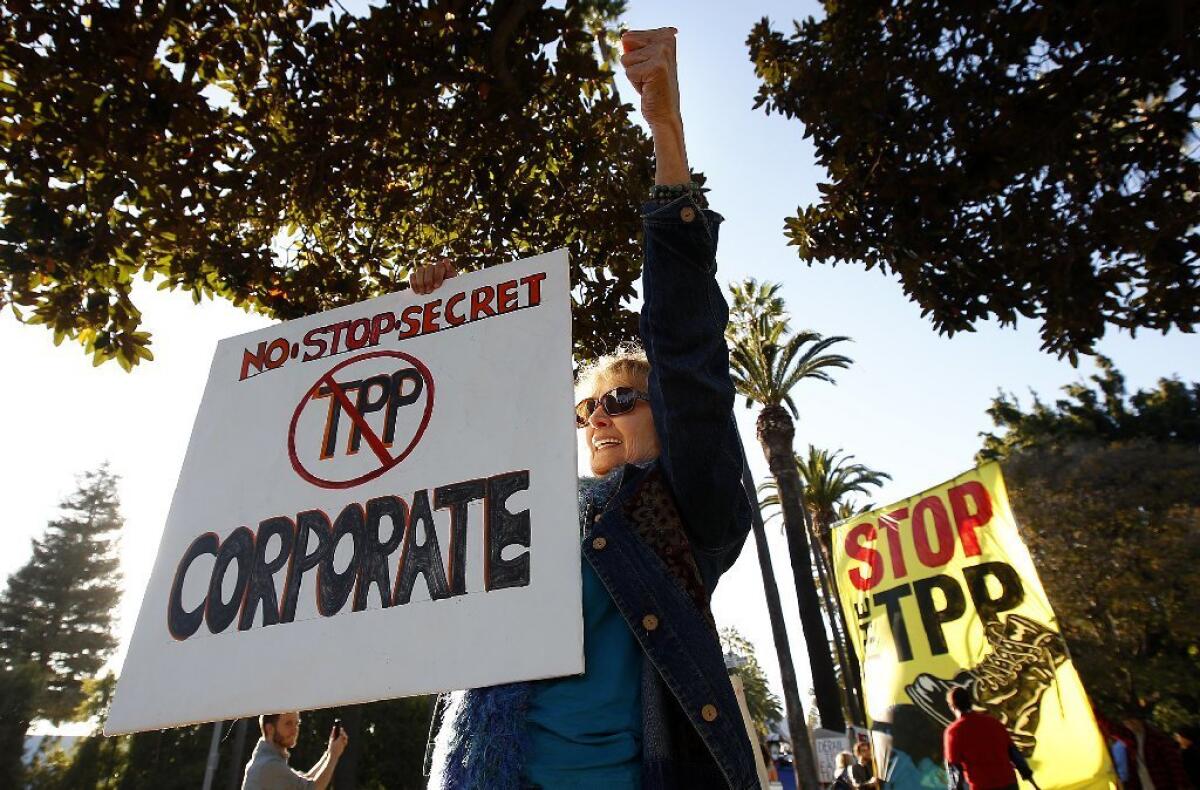Op-Ed: Free trade on steroids: The threat of the Trans-Pacific Partnership

- Share via
Many supporters of the proposed Trans-Pacific Partnership, or TPP, trade agreement are arguing that its fate rests on President Obama’s bilateral talks with Japanese Prime Minister Shinzo Abe in Japan this week. If Japan and the United States can sort out market access issues for agriculture and automobiles, the wisdom goes, this huge deal — in effect, a North American Free Trade Agreement on steroids — can at last be concluded.
But this view obscures the many seemingly intractable problems TPP negotiators are grappling with. There are other unresolved issues — such as intellectual property concerns that could limit access to affordable medicines — that have deadlocked the 12-nation pact.
And for every issue that is being intensely discussed, there are others that are being swept under the rug. For instance, bipartisan majorities in Congress have demanded rules in TPP against currency cheating, but the Obama administration has refused to include them.
But foremost among all these issues is the devastating effect the agreement would have on jobs and the American middle class. Americans were promised 20 years ago that NAFTA would bring an unprecedented economic boom and 200,000 jobs in the first year. The three of us doubted those promises and voted against it. The data on NAFTA’s outcomes make clear that the concerns we and other critics had were warranted.
In 1993, before NAFTA, the U.S. had a $2.5-billion trade surplus with Mexico and a $29-billion deficit with Canada. By 2012, that had exploded into a combined NAFTA trade deficit of $181 billion. Since NAFTA, more than 845,000 U.S. workers in the manufacturing sector — and this is likely an undercount — have been certified under just one narrow program for trade adjustment assistance. They qualified because they lost their jobs due to increased imports from Canada and Mexico, or the relocation of factories to those nations.
Even worse, NAFTA has been used as a model for additional agreements, and its deeply flawed approach has resulted in the outsourcing of jobs, downward pressure on wages and a meteoric rise in income inequality.
For example, to sell the NAFTA-style U.S. agreement with South Korea passed in 2011, Obama said it would support “70,000 American jobs from increased goods exports alone.” In reality, U.S. monthly exports to South Korea fell 11% in the pact’s first two years, imports rose and the U.S. trade deficit exploded by 47%. This led to a net loss of tens of thousands of U.S. jobs in this pact’s first two years.
Now we are hearing that the TPP, as we were promised with other pacts, will mean prosperity around the corner.
But this agreement would force Americans to compete against workers from nations such as Vietnam, where the minimum wage is $2.75 a day. It threatens to roll back financial regulation, environmental standards and U.S. laws that protect the safety of drugs we take, food we eat and toys we give our children. It would create binding policies on countless subjects, so that Congress and state legislatures would be thwarted from mitigating the pact’s damage.
Therefore, it is all the more disturbing that the administration has asked for “fast-track” trade promotion authority. Under fast track, the president could sign the TPP before Congress votes on it, with a guarantee that Congress — after limited debate and with all amendments forbidden — would vote to ratify it within 90 days.
Despite Congress’ exclusive constitutional authority over the substance of U.S. trade policy, it would be left powerless to alter the pact, however destructive it might be for workers and families, and could only vote yay or nay on the document.
According to a poll this year, nearly two-thirds of Americans oppose the granting of such fast-track authority. Last year, nearly 200 House members, from both parties, declared their opposition to it. The chorus swelled this year when legislation to establish fast-track was introduced; the bill failed to attract a single House Democratic sponsor. This makes the administration’s push to conclude the TPP on the president’s trip to Japan even more questionable.
Meanwhile, the arguments made by Vice President Joe Biden and others that the deal is crucial to demonstrating the U.S. commitment to the region or to uniting with allies to counter a rising power — in this case, China — are tired claims that repeatedly have proved false when raised to sell past pacts.
There are many things we can do to enhance our competitiveness with China and in the global economy.
We can invest in our own infrastructure, manufacturing and job training. We can work harder to address issues like currency manipulation, unfair subsidies for state-owned enterprises in other nations and global labor protections. We can enter deals that increase U.S. exports while doing right by our workers and our priorities, and we can address the real foreign policy challenges in Asia with appropriate policies instead of through a commercial agreement that could weaken the United States and its allies.
What we should not do is blindly endorse any more unfair NAFTA-style trade agreements, negotiated behind closed doors, that threaten to sell out American workers, offshore our manufacturing sector and accelerate the downward spiral of wages and benefits.
George Miller represents California’s 11th Congressional District, Rosa DeLauro represents Connecticut’s 3rd District and Louise Slaughter represents New York’s 25th District. All are Democrats.
More to Read
A cure for the common opinion
Get thought-provoking perspectives with our weekly newsletter.
You may occasionally receive promotional content from the Los Angeles Times.









